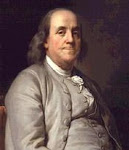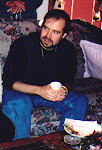Friday, March 11, 2011
Moonwalking with Einstein
I needed a break.
I am roughly half-way through about 3 books and I wasn't feeling the momentum. I knew I needed a jolt and that was provided by my wife's fascination with a book featured in Discovery magazine. We talked about it and it just seemed like a fascinating topic.
I purchased Moonwalking with Einstein and devoured it. It's a quick read and, most important to me, it adds something to my life.
Josh Foer was a journalist who covered the world memory championship only to discover that none of the mental athletes considered themselves to be savants or anything close. To test the theory that anyone could do what mental athletes could so with training, Foer trained and won the American memory title the very next year.
Most fascinating about this book is that Foer succeeds in walking the reader through some of the techniques. He walks the reader through the process of memorizing a 15-item grocery list and left a vivid picture of that list in my mind. It is very illustrative... to the point that I literally cannot forget this grocery list.
I have been left with images, at our old Virginia home, of the following;
... a man with a snorkel diving into the sink... salmon cooking on the vent of out television with smoking peat providing the heat... an elk screeching at the top of our stairs... socks dancing on the fireplace hearth and a she-male at a desk with Sophia Loren on his/her lap.
I couldn't forget that list if I wanted to. Jen and I ended up memorizing two of our credit card numbers to test the number formula... and it worked.
Although the book is not a self-help book, it gives any ambitious reader the tools to begin tinkering with his or her own brain. I will begin to work on this technique to memorize the presidents in order and my goal is to eventually memorize the Colorado Probate Code so I can work more efficiently.
There is a natural conflict between the ancient memory techniques documented in this book and our modern world and its many memory crutches (like i-phones, the Internet in general, etc.). I tend to believe that, although such tricks may no longer be necessary, there is nothing wrong with sharpening the saw, so to speak. Also, I like a good challenge.
Foer includes information about patients who represent the extremes of the memory spectrum - from the man who could not forget, to people who could not remember anything. He discusses the physiology of memory (what little is really understood) and the study of expertise.
Moonwalking with Einstein is a real feast. I loved it. I have a new leader on the early-season rankings.
Tuesday, March 1, 2011
Unlikely Disciple
I read, Unlikely Disciple by Kevin Roose, which was assigned to me by Book. As we have all said about our book challenge, the best part is horizon-expansion - and this book certainly probed new territory for me.
I struggled with this book, but not in a bad way. I struggled because this book will hold up a mirror to anyone on either side of the God divide.
Roose spent a semester at Liberty University, Jerry Falwell's evangelical university. He came away with a better understanding of what makes evangelicals tick. So, why was this a struggle? Two reasons. 1) It touches a blind-spot issue for me; 2) the author's undercover status.
I've always viewed Falwell and his ilk as being on the "wrong end of the fire hose" politically. In Jerry's case, this is a literal description because he fought the Civil Rights Act and was openly in favor of segregation. Although he repented later, its hard to know (and harder to convince myself) that the repentance was true rather than politically helpful.
Thus, I have always viewed his gay-bashing as particularly anger-inducing. It "smacks of the fire hose" from a person who held that political position before. Although I have debated the gay issue with close friends without animosity, I admit that it's a topic that requires regulation. And therein lies my struggle with this book.
I admit that I have a bit of a blind spot on this issue. And, many of the characters in this book have no problem saying what I would consider to be slurs on a daily basis. The author excuses it to a point by explaining the culture in which they live and were raised. I struggled with that justification. By the midpoint of this book I was very agitated and at times outright angry.
But, by the end, the whole picture came into better focus. I enjoyed the book overall and feel it had an impact. Any anger induced was a part of the greater experience. That experience led to a humanizing of a segment of our nation I don't get to see often. And, although humanizing does not equal agreement, it accomplished reflection on my part.
I also struggled with Roose's ruse. He had to mislead his classmates if this book was going to succeed. I get that. I understand that. But, every journalistic bone in my body is worn out waving red flags about it.
By the end, I understood why he had to go undercover, but that didn't mean it didn't feel awkward. Roose struggled with that ethical issue as well. Surprisingly, none of the students seemed bothered when he finally told them.
An impactful book leads to contemplation, and I don't think I'm done contemplating this one. I wont' be done for awhile.
Subscribe to:
Posts (Atom)


